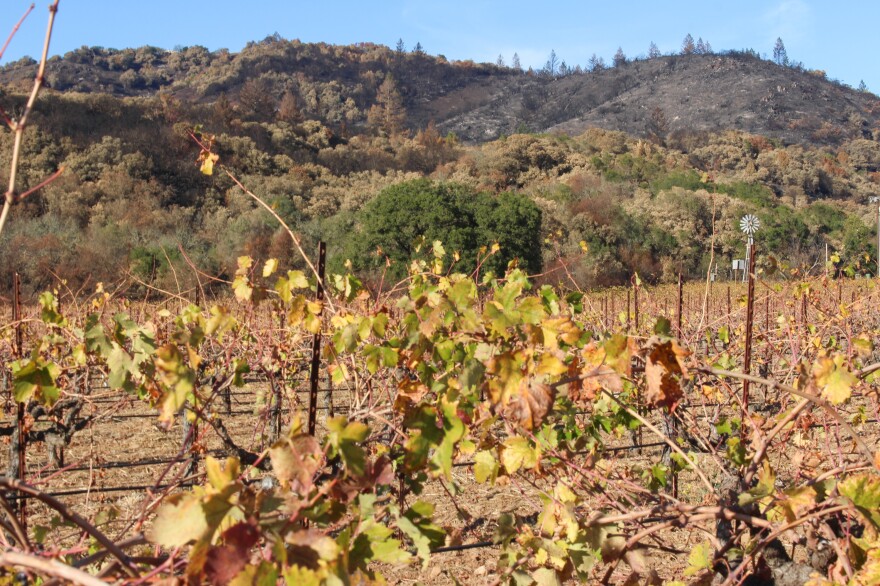Buena Vista winery in Sonoma Valley, founded in 1857, is considered the birthplace of California wine. The cavernous cellar, carved into a hill by Chinese laborers, has survived earthquakes, several owners and last month's fires in Northern California.
Now, the black tree stumps and scorched hills right next to the winery's buildings show just how close the flames came — less than 30 feet, says Tom Blackwood, general manager at Buena Vista.
"The fire could not have come any closer without hitting the buildings. Buena Vista was surrounded by flames," says Blackwood, who credited firefighters with saving the winery, which withstood untouched. "We are so lucky."

But since Buena Vista reopened a couple of weeks ago, Blackwood is facing another problem: a big drop in visitors. During the month before the fires began, Buena Vista saw 6,000 visitors, says Blackwood. But since the winery reopened about two weeks ago, only 500 visitors have shown up.
"If the fires hadn't happened we would probably see about 50 or more people here at the bar," says Blackwood, gazing at the winery's relatively quiet tasting room. "What do we have here, like six people now at the bar?"
Last month's fires in Northern California hit wine country during peak tourist season. While some businesses burned, many others were forced to close temporarily because of lack of road access or bad air quality when the fires raged. Now that the danger has passed, wineries and restaurants across the region are open and want visitors to return.
Most of the cancellations came from tourists who are not local, according to small businesses in Sonoma Valley — a region where burned hills, homes and cars can be seen.
"Once the fires were under control, we found that very few people had decided to return. There was initially a fear of the entire valley being burned," says Hunt Bailie, who owns a small segway and bicycle tour company with his wife in the town of Sonoma. He said about 90 percent of his tours were cancelled.
"We found that most folks are interested in returning, but they think it might be too soon," says Bailie. "Typically October is the time when we can save all the pennies until spring, but that month dried up for us."
While the affected areas were "very limited," news coverage all over the world mostly showed destruction from the fires, says Caroline Beteta, who heads Visit California, the organization tasked with attracting tourists to the state.

"Just the imagery alone I would argue did more damage than the actual damage to the tourism infrastructure," Beteta told a conference of wine marketers in Santa Rosa, the biggest city in Sonoma county. News images of charred houses and red glowing skies flashed behind her.
Tim Zahner, chief operations officer for Sonoma County Tourism, says most hotels and wineries in the county are fine, and are pouring in their tasting rooms today.
"The weather is mild. You know if you're in Chicago and it's November and it's snowing, out here it is not snowing. It's gorgeous," says Zahner, who was also attending the wine marketing conference. "It's a good time to come visit."
His group and Beteta's are trying to convince visitors to return to the region. Visit California launched a $2 million dollar advertising campaign to bring back images of sunny vineyards and happy couples enjoying a glass of cabernet sauvignon — wine country images.
Economist Robert Eyler says it's too early to tell the economic impact of the fires on tourism. But he expects the county to overcome any downturn in visitors.

"The brand of Sonoma and wine country is going to survive because the brand is very very established," says Eyler, a professor at Sonoma State University. "This is something that is a brand challenge in the short term. I would be flabbergasted if it was in the long."
That brand is something local small business owners are counting on. People like Mingma Sherpa, who co-owns a Mexican restaurant about two miles from the fire line.
The immigrant from Nepal estimates half of his customers are gone. Before the fires, at least one tour bus would stop here daily, he said.
"Since that happened, most of them have cancelled," says Sherpa, adding that the sudden loss in revenue forced him to cut shifts for servers and other employees.
"It's definitely tough. But this town is very special. So hopefully they'll come back," he says.
Copyright 2017 KQED

